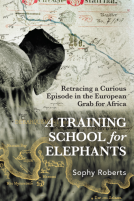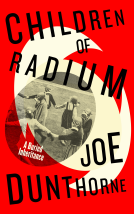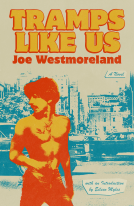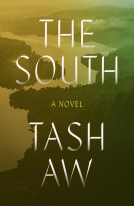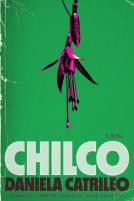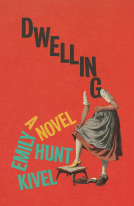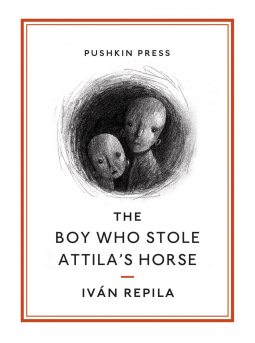
The Boy Who Stole Attila's Horse
by Ivan Repila
This title was previously available on NetGalley and is now archived.
Send NetGalley books directly to your Kindle or Kindle app
1
To read on a Kindle or Kindle app, please add kindle@netgalley.com as an approved email address to receive files in your Amazon account. Click here for step-by-step instructions.
2
Also find your Kindle email address within your Amazon account, and enter it here.
Pub Date Nov 24 2015 | Archive Date Sep 14 2015
Pushkin Press | Pushkin Collection
Description
Two brothers, Big and Small, are trapped at the bottom of a well, stalked by madness and with no means of escape. Struggling for sustenance and clinging to sanity, Big forges a plan to free his little brother. Fast-paced and rich in metaphor, this extraordinary new story poses questions of fight, survival and solidarity when people are faced with devastation.
Powerful, disquieting and highly original, Repila's unique allegory explores with bravery and emotion the depths of human desperation and, ultimately, our almost unending capacity for hope.
Advance Praise
"Here is a story conceived to leave its mark, to be felt in the pit of one's stomach" - Librairie L'Ouvre-Boîte
"This is a masterpiece concentrated into 110 pages...This is the sort of book that you don't put down, and leaves you with a knot in your stomach" - Clara Dupont-Monod, France Inter
"Suffocation and disgust are the dominant impressions, and yet... this book is a charm... Iván Repila's language is superb, it carries with it all the spells of fairytales with their ogres, wolves and evil stepmothers, but it also manages to evoke the much less fantastical universe of camps, prisons and caves where hostages waste away" - Éric Chevillard, Le Monde
"lyrical and realistic." - Zoé Valdés
"You will emerge from it changed, grown up... an essential novel... a masterpiece" - La soupe de l'espace
"It's been a long time since I have read such an impressive book. With its rich and wise prose, combination of mannerism and enlightenment, this broken tale of what makes us tedious and atrocious is also a harsh song of love" - Tendencias 21
"A vivid novel, full of metaphors and symbols about cooperation, the effort to survive, the world's brutality, and solidarity. All things that remind us of present and universal circumstances" - Revista de letras
"A brutal, Beckett-like tale. Its end is cathartic, hopeful and violent. It is utopian, and reminds us that language is the only thing that can save us: because language is everything" - La Vanguardia
"A seemingly traditional story which works on different levels of reading. A precise novel, solid and disquieting, veiling a deep wisdom" - El País
Available Editions
| EDITION | Other Format |
| ISBN | 9781782271017 |
| PRICE | $16.00 (USD) |
Featured Reviews
 madeleine m, Reviewer
madeleine m, Reviewer
THE BOY WHO STOLE ATTILA'S HORSE by Iván Repila
This novel could be about a deep well, where two children find themselves, it could be about prisoners of war, sequestered in a small hut, unable to escape...or it could also be your neighbors, living a life of desperation...It is about any circumstance which challenges the human will to live, to survive in the face of unimaginable challenges.
Author Yván Repila chose to tell us the story of two children, who find themselves in a deep well. Big and Small are brothers, how they fell into the well isn't readily clear, until later. How can two individuals live in such a small space, with little hope of ever being found, without being able to climb out...with death and starvation their constant companions. The human spirit is an amazing gift, through these boys the author answers the question: why do some survive and others do not, without spoiling his tale, the answer isn't necessarily what we have grown to believe.
On a personal note, there is so much beauty, insight, and knowledge in these few pages, it made me wonder if the author had experienced a suffering which gave him such a clear view on the subject of survival.
I admire his choice of children in an otherwise adult novel. Children are pure at heart, their emotions lay at the surface, truth is readily spoken.
These brothers came to life for me, I feared for them, I even found myself with tears, which doesn't doesn't happen often.
I would like to see Iván Repila's other books translated. He is a rare talent.
Thank you NetGalley for allowing me to read this novel.
 Educator 211653
Educator 211653
Thank you Net Galley. A beautiful novella. Repila has described the nature of the modern world and the struggle for survival in spare, relentless prose, that is compelling, hard to stop reading, even as it is terrible. A must read.
 Catriona M, Bookseller
Catriona M, Bookseller
A gut punch of a novella, disturbing but beautifully written. I read with fascination and trepidation.
 Helen M, Bookseller
Helen M, Bookseller
A small but perfectly formed allegorical tale about two young brothers (Big and Small) stuck down a well and the things they do to try and survive.
As a testament to the indomitability of the human spirit, it's a moving tale of how even in the face of overwhelming odds the will to survive eclipses everything - they will eat anything, drink anything, consider anything, if they think it will keep them alive.
As they become increasingly weak and confused, their hallucinations make for interesting reading, as the brothers descend into the depths of insanity.
A wonderfully written and seemingly simple tale, that stays with you long after the final page.
 Kel M, Media/Journalist
Kel M, Media/Journalist
In translation
The Boy Who Stole Attila’s Horse by Iván Repila, translated by Sophie Hughes (Pushkin Press, $16).
Death by Water: A Novel by Kenzaburō Ōe, translated by Deborah Boliver Boehm (Grove Press, $28).
Iván Repila’s second novel, The Boy Who Stole Attila’s Horse, is the first translated from Spanish to English. In it, two brothers, Big and Small, are trapped in a deep well. As their names suggest, they are more than just children, and their situation is desperate.
The details of how and why they ended up in the well are cloudy, and so we know that this short novel is an allegory; even so, the details of their struggle for survival are realistic and wrenching, particularly in the revelations of their relationship and the ever-increasing psychological strain on Small.
With a relentless recording of the time the boys have been trapped, as well as rich, grim writing about the physical effects, Repila juxtaposes the incredibly realistic impending tragedy with larger, more philosophical questions that exist on the edge of our awareness.
Japanese Nobel Laureate Kenzaburō Ōe is well known in English translation; his latest novel, Death by Water, is an incredibly multifaceted look at the nature of narrative and fact. In it,
Ōe’s alter-ego, the elderly writer Kogito Choko, returns to his hometown to write the novel he always meant to write about the drowning death of his father during the war years.
But as he investigates, he discovers his mother destroyed the contents of his father’s trunk, then he meets some people who were witnesses to the accident that killed him. He’s also drawn toward an experimental theater troupe which is staging adaptations of all his owb works, and the stress from his failure at writing what he calls “the drowning novel” results in strained family relations, so that absurd comedy and domestic drama both wind their way around Choko’s search for a way to make art from a confusing, wrought past.
Ultimately, Choko’s “drowning novel” has much larger implications, questioning the value of narrative itself, particularly if what one seeks is objective truth.
 Robert O, Educator
Robert O, Educator
Review of The Boy Who Stole Attila’s Horse by Iván Repila
Review by Susanne Parker
At the bottom of an abandoned well, in the center of a forest, two children struggle to survive. They are called Big and Small, and they are brothers. Iván Repila’s second novel, translated from Spanish by Sophie Hughes, offers the English-speaking world a chance to wrestle with this existentialist allegory.
Like Cormac McCarthy’s The Road, or Samuel Beckett’s Waiting for Godot, life for the boys is a game of patient suffering. As in Godot, there is a God figure- a mysterious person who comes to gaze down at the children during the night, doing nothing to help them. The story is wrought with a McCarthy-esque stillness of tone and violence of imagery, because “Displays of affection aren’t called for in a world dictated by the need to survive. Love is like a vow of silence, where cruelties befitting a reptile, a prehistoric crocodile, are meted out.” That silent love is essential. As in McCarthy and Beckett’s work, motivation to go on existing in the face of extreme futility lies in Big and Small’s relationship to each other.
Big makes the laws of their new life and governs his brother with authoritarian determination. They have a small bag of food, but the food in the bag is Mother’s, he tells Small; it is not to be eaten. He drives his point home with a blow to the face and a death threat. Instead they subsist on maggots, worms, and roots, clawed from the walls of the well. Small is the deep thinker of the pair, and his spirit rebels against their reality, preferring madness. Big is the realist, the caretaker, and the doer. Big “envies Small’s indolence and self-absorption, and all the shades of grey that his world seems to contain.” Small “admires the simplicity of his brother. It must be easy to make decisions in a world with such radical contrasts, where everything is black and white.” Together they embody mankind. As their health deteriorates, Big performs a ludicrous exercise regime while Small enters the rabbit hole of his mind.
Small’s insanity is revelation. Repila uses the child’s babblings to deepen symbolism and engage with existentialist questions. Small has the absurdist preoccupation with the ineffectiveness of language, and the resulting inability to truly communicate with another person. He says, “I think no one hears our cries because they mistake us for animals. You and I haven’t noticed till now, but for days we have been talking like pigs.” Then Small endures a bout of aphasia, a medical condition which renders him unable to form coherent words.
When he recovers his powers of speech, Small reveals insight into the universality of their situation. “Is this the real world?” he asks. “Are we really children?” And then, “Is this it? Must men live within walls with no windows or doors?” Small preaches about a minority of mankind unwilling to accept the captive lifestyle. Big takes his monologues as evidence of madness, and plugs his ears with dirt, not understanding.
Repila’s use of Small as a vessel to transmit these underlying ideas is heavy-handed; he places more emphasis on the two boys as everyman figures than as real children. Small’s dialogue is often anything but childish, using complex words and rhetorical structures. Repila acknowledges this, saying “He looks with the eyes of an adult who has eaten a child and infected him with a hundred centuries of madness.” Although the artifice is obvious, it works. Small’s words connect with the narrative and give it meaning. Repila sacrifices realism for this aim, but it’s an effective sacrifice.
Time passes differently in the well; rather than numbering chapters in an orderly sequence, chapters are labeled according to the number of days the boys have spent in their prison. Big instructs Small how to commit a murder. He nurses his brother with rough tenderness through fevers and hallucinations. They play games. They tell stories- dark and vengeful fairytales. Once such story reveals the source of the book’s title: A boy steals Attila the Hun’s horse, cuts off its hooves, and wears them as shoes. Wherever he steps, the land beneath his feet dies, and when he steps experimentally on human beings, those die too, in vivid color and grotesque description. Pleased with his powerful station as a ruthless destroyer, he spends his life killing, then buries the shoes in a well, guarded by two children. The tale is perhaps an attempt to endow their entrapment with purpose, as well as a portrait of the hatefulness which led to their presence there.
One would expect, given the genre, that Repila’s novel would end without resolution or comfort. However, with the brother’s culminating effort at escape, the reader finds answers to the questions seeded in previous chapters, and even sees glimpses of hope through the sorrow. It’s a satisfying conclusion that justifies the digging and interpreting required by the rest of the text. The Boy Who Stole Attila’s Horse, while a quick read at only 108 pages, successfully conveys one interpretation of human life. It’s up to the reader to sift that interpretation through his/her personal beliefs and come to terms with the outcome.



